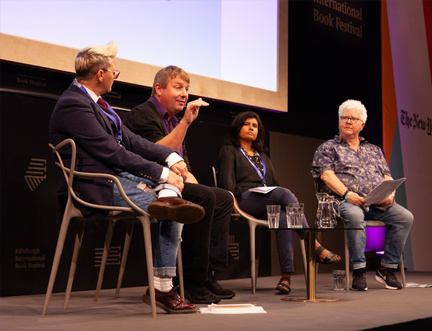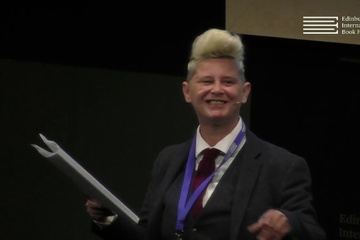More articles Saturday 17 August 2019 3:30pm
“We are governed by people who believe that the threat of having to live on the streets is a useful threat,” according to Danny Dorling

“We are governed by people who believe that the threat of having to live on the streets is a useful threat to get people to behave,” Danny Dorling said on Thursday. The social geographer was discussing the homelessness crisis with writer and poet Joelle Taylor, sociologist Geetha Marcus and author Val McDermid in a panel event at the Book Festival. Dorling’s new book, Peak Inequality, includes an examination of the housing situation in Britain.
“There’s been a huge rise in people on the streets and people being evicted by landlords, because this is the main reason for the rise – eviction by private landlords,” he said. “2% of people are now experiencing acute homelessness which is the same proportion of us who are private landlords.
“You don’t go through housing ministers with it getting worse each year, without it being the truth that they really don’t actually care. I think we’ve really got to begin to accept that this is not a cock up...It’s not a mistake – they know exactly what they’re doing.”
Joelle Taylor, author of the poetry collection Songs My Enemy Taught Me, agreed with Dorling, saying;
“This is idiotic, this doesn’t need to happen. The first thing is acknowledging that this is an ideology, and we’re being forced into this… hyper-capitalist system. But I think there’s a real danger in us taking it in as individuals because this is our government, our state doing this. We’ve got individuals running foodbanks but it’s becoming… this idea that it’s really normal. We don’t see it anymore because it’s so normalised.”
Geetha Marcus, whose book Gypsy and Traveller Girls examines different understandings of home and homelessness in traveller communities, claimed that this crisis is a part of a wider political trend.
“I think there continues to be state sponsored, structural, institutional and cultural violence reflected in the expulsion of the Windrush generation, Grenfell, the rise of anti-immigrant sentiments, the use and misuse of detention centres for asylum seekers and refugees, the rise in stop and search targeting black men in particular, Islamophobia, particularly directed at Muslim women, the rise in anti-Semitism, the role of certain sections of the media in spreading hate, the universal credit system, the incarceration of our young people with mental health issues, rising childhood poverty across the board, not just affecting the white working class.
“Knit them together and a far darker picture emerges. I believe Britain is being stripped of its social infrastructure, the institutions that make up her daily life.
“Our social infrastructure, never mind our physical infrastructure, up and down the country continues to be decimated from hostile policies that wage war against our own people. People need to have mobility and dignity in their lives, it is a human right. And they need other people to also recognise it in them.”
Taylor performed two poems inspired by her own experience of homelessness, and explained the importance to her of story-telling in enacting change.
“If you control language, if you control stories, then you control some kind of outcome, you control yourself. You make connections with other people. For me the greatest things about literary events is what’s going to happen next, not just in book signings, but in conversations.”
- 2025 Festival:
- 9-24 August
Latest News
 Communities Programme participants celebrate success of 2024
Communities Programme participants celebrate success of 2024




